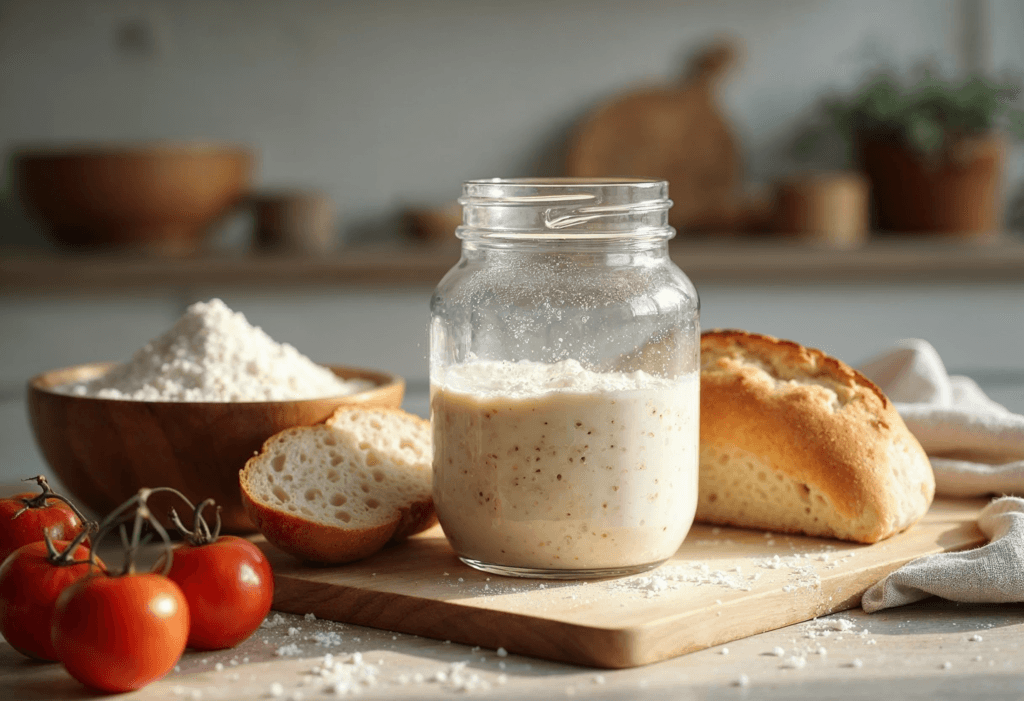Sourdough bread has taken the world by storm. Walk into any trendy bakery, and you’ll find sourdough loaves stacked up like golden treasures. But the real question lingering on everyone’s mind is—is it OK to eat sourdough bread every day? Well, you’re about to find out!
This guide will uncover the truth about sourdough bread, its health benefits, potential drawbacks, and whether you should make it part of your daily diet. If you’ve ever wondered whether this tangy, chewy bread is a guilt-free delight or a dietary pitfall, keep reading. Spoiler alert: it’s not your average white bread! 🥖
Introduction to Sourdough Bread
Sourdough bread is more than just a rustic loaf that looks pretty on your Instagram feed. It’s one of the oldest types of bread, dating back to ancient Egypt over 5,000 years ago. Unlike regular bread made with commercial yeast, sourdough uses a natural fermentation process, which gives it that distinctive tangy flavor and chewy texture.
If you’ve ever tasted it, you know how unique it is. But beyond the taste, sourdough has gained a reputation for being healthier than your typical bread.
What Makes Sourdough Bread Unique?
The Fermentation Process in Sourdough
What sets sourdough apart is its fermentation process. Instead of relying on commercial yeast, sourdough is made with a starter, which is a mixture of flour and water that naturally captures wild yeast and bacteria from the environment. This starter feeds on the flour, creating carbon dioxide bubbles and producing that airy, flavorful bread we love.
This natural fermentation breaks down gluten and phytic acid, making sourdough easier to digest compared to most bread. Think of it as the bread equivalent of fine wine—it takes time and patience to develop its flavor and nutritional benefits.
Nutritional Profile of Sourdough Bread
So, what’s inside this magic loaf? Here’s a quick breakdown of the nutrients you can find in sourdough bread:
- Complex Carbohydrates – A steady source of energy without the sugar spikes.
- Fiber – Especially in whole-grain sourdough, helping with digestion.
- Probiotics – Thanks to fermentation, sourdough contains good bacteria for gut health.
- Vitamins and Minerals – Rich in B vitamins, iron, selenium, and zinc.
Fun fact: Sourdough bread often has a lower glycemic index (GI) compared to white bread, which means it doesn’t spike your blood sugar as quickly. That’s great news if you’re watching your carbs or managing diabetes!
“Sourdough bread isn’t just a loaf; it’s a nutritious, living product of nature that works with your body, not against it.”
Health Benefits of Eating Sourdough Bread Daily
Let’s dive into the good stuff—why eating sourdough bread daily might actually be a good idea. Here are some of the top health benefits that make sourdough stand out.
Improved Digestibility Due to Fermentation
If regular bread leaves you feeling bloated or uncomfortable, sourdough might be your new best friend. The fermentation process breaks down gluten and phytic acid, making it easier for your stomach to handle.
Think of gluten as a tough chain that your gut has to break apart. Fermentation acts like a pair of scissors, snipping the chains into smaller, more digestible pieces. That’s why some people who have mild gluten sensitivity (not celiac disease) can often tolerate sourdough bread better than regular bread.
Sourdough Bread and Blood Sugar Control
One of the standout benefits of sourdough is its effect on blood sugar. Because of its lower glycemic index, sourdough bread doesn’t cause rapid spikes in blood glucose.
Why does this matter? Well, high blood sugar can lead to energy crashes, increased hunger, and long-term health issues like type 2 diabetes. Sourdough offers a slower release of energy, keeping you full and energized for longer.
In simpler terms, it’s like upgrading from a rollercoaster ride to a smooth, scenic train ride for your blood sugar levels. 🚂
Rich in Probiotics and Gut Health Benefits
Your gut is like a bustling city of bacteria, and probiotics are the friendly citizens. Thanks to its natural fermentation, sourdough bread contains beneficial bacteria that promote gut health.
These probiotics help:
- Improve digestion
- Boost your immune system
- Reduce inflammation in the body
By eating sourdough daily, you’re essentially giving your gut a little love and care. It’s like planting flowers in your gut garden and watching it thrive! 🌼
Higher Nutritional Value Compared to Regular Bread
Here’s the deal—sourdough bread isn’t just easier to digest; it’s also more nutritious. During fermentation, the bacteria in the starter break down phytic acid, which can block the absorption of minerals like calcium, magnesium, and iron.
This means your body can better absorb the nutrients in sourdough bread compared to regular bread. So you’re not just eating empty carbs—you’re getting a solid dose of vitamins and minerals to fuel your day.

Common Concerns About Eating Sourdough Bread Every Day
Now, before you start replacing every meal with sourdough toast, let’s address some common concerns. Is it really all sunshine and rainbows, or are there a few things you should watch out for?
Is It Too Caloric for Daily Consumption?
Let’s get real—bread, including sourdough, does contain calories. A typical slice of sourdough bread has around 120-150 calories. If you’re eating multiple slices a day, those calories can add up.
But here’s the kicker: sourdough is incredibly filling, so you’re less likely to overeat compared to regular bread. Pair it with healthy toppings like avocado or eggs, and it can be part of a balanced, satisfying meal.
Gluten Content: Is It Safe for Gluten-Sensitive Individuals?
While sourdough is easier to digest because of its lower gluten content, it’s not gluten-free. If you have celiac disease or a severe gluten intolerance, sourdough isn’t for you.
However, for those with mild gluten sensitivity, sourdough can often be a game-changer. The fermentation process reduces gluten levels significantly, making it more tolerable than conventional bread.
“Sourdough bread is gluten-light, not gluten-free—perfect for some, but not for everyone.”
H2: Who Should Avoid Eating Sourdough Bread Every Day?
As much as sourdough bread sounds like the perfect food, it’s not for everyone. While it boasts numerous benefits, some individuals might need to limit or avoid it altogether. Let’s break it down.
Individuals with Gluten Intolerance or Celiac Disease
If you have celiac disease, a condition where gluten damages your small intestine, sourdough bread is off-limits. Despite being easier to digest and lower in gluten than regular bread, sourdough still contains enough gluten to cause serious issues for people with celiac disease.
Even for those with gluten sensitivity, it’s a case-by-case situation. Some people tolerate sourdough well, while others still experience bloating or discomfort. Always listen to your body!
People with Certain Digestive Disorders
While sourdough can improve digestion for many, individuals with digestive disorders like IBS (Irritable Bowel Syndrome) might find it problematic. The fermentation process produces certain short-chain carbohydrates called FODMAPs, which can trigger symptoms in some people.
If you experience bloating, gas, or stomach cramps after eating sourdough, it might not be the bread for you. Consider consulting a dietitian to evaluate your tolerance.
Those Watching Their Carbohydrate Intake Closely
Are you on a low-carb diet like keto? If so, sourdough bread might not fit into your macros. While it’s a healthier option than white bread, it still contains carbs, which can interfere with strict carb-counting diets.
However, if you’re following a balanced, moderate-carb diet, sourdough can still be your best bread buddy. Just stick to recommended portion sizes (we’ll get to that soon!).
Common Problems and Solutions with Sourdough Consumption
Like any food, sourdough bread comes with its own set of challenges. Here are a few common problems people face—and how to solve them.
Problem: Overeating Sourdough Bread Daily
We get it—sourdough bread is absolutely delicious. That tangy flavor and chewy texture make it so tempting to eat slice after slice. But like anything in life, moderation is key. Overeating sourdough daily can lead to unwanted weight gain or excessive calorie intake.
Solution: Stick to 1-2 slices of sourdough per day as part of a balanced diet. Pair it with high-protein and fiber-rich toppings like eggs, hummus, or avocado to keep you full longer and prevent mindless snacking.
Problem: Difficulty Finding True Sourdough Bread
Not all sourdough is created equal. Many store-bought loaves lack the nutritional value of real sourdough. For a delicious and foolproof homemade option, consider learning How Much Sourdough Starter to Use for 500g Flour. This guide offers practical tips to perfect your baking ratios.
Solution: Look for key indicators of real sourdough bread:
- Ingredients: It should only contain flour, water, salt, and starter.
- Texture and Flavor: Real sourdough has a tangy taste and chewy texture.
- Crust: It’s thicker, darker, and more rustic.
If you want to be 100% sure, consider baking your own sourdough bread at home. Not only is it rewarding, but it also allows you to control the ingredients and fermentation time.
High Sodium Content in Sourdough Bread
Bread, in general, tends to contain a decent amount of sodium, and sourdough is no exception. Excess sodium can contribute to high blood pressure and other cardiovascular issues if consumed in large quantities.
Solution: Choose sourdough loaves with lower sodium content, or bake your own and adjust the salt to suit your needs. Pair your bread with low-sodium meals to keep your daily sodium intake balanced.

How Much Sourdough Bread Is Safe to Eat Daily?
When it comes to sourdough, portion control is key. The good news is that you don’t have to eliminate it from your diet entirely—far from it!
Portion Recommendations for Optimal Health Benefits
The ideal portion of sourdough bread varies depending on your overall diet and lifestyle. Here’s a general guideline:
- 1-2 slices per day is safe for most people.
- If you’re active or have higher energy needs, you can enjoy an extra slice without worry.
- For those on a lower-calorie or low-carb diet, sticking to one slice might be best.
Incorporating Sourdough Bread into a Balanced Diet
Sourdough bread can be part of a healthy, balanced diet when paired with nutrient-dense foods. Here are a few delicious and balanced meal ideas:
- Avocado Toast: A slice of sourdough topped with smashed avocado, cherry tomatoes, and a sprinkle of seeds. 🥑
- Egg and Spinach Sandwich: A poached egg, sautéed spinach, and a dash of hot sauce on sourdough.
- Hummus and Veggie Toast: Creamy hummus with sliced cucumbers, radishes, and a pinch of paprika.
The goal is to treat sourdough as the supporting act of your meal, not the main event. Balance is everything!
How to Choose or Make the Healthiest Sourdough Bread
If you’re serious about adding sourdough to your daily diet, you’ll want to make sure you’re eating the healthiest version possible.
Key Ingredients to Look For in Quality Sourdough Bread
When shopping for sourdough bread, check the label. The best sourdough contains:
- Flour (preferably whole grain)
- Water
- Salt
- Starter (natural yeast)
Avoid loaves with added sugars, preservatives, or artificial flavoring. Whole-grain sourdough offers more fiber, vitamins, and minerals compared to white flour versions.
Baking Sourdough Bread at Home: Tips and Benefits
Want to take matters into your own hands? Baking sourdough bread at home isn’t as intimidating as it sounds. It just requires patience, a good starter, and some love. Here’s why you might want to try it:
- Control Over Ingredients: You decide what goes in your bread—no hidden additives!
- Better Fermentation: You can let your starter ferment longer for a more nutritious loaf.
- Cost-Effective: Making sourdough at home is cheaper than buying premium loaves from bakeries.
Final Verdict: Should You Eat Sourdough Bread Every Day?
So, let’s get to the heart of the matter—is it OK to eat sourdough bread every day? The answer depends on your personal health goals, dietary needs, and how you consume it. For most people, enjoying a slice or two of sourdough daily can provide significant health benefits without downsides.
Sourdough bread’s unique fermentation process makes it easier to digest, nutritious, and gut-friendly compared to traditional bread. It offers sustained energy, keeps blood sugar in check, and provides essential nutrients. However, moderation and balance are key—just because it’s healthy doesn’t mean you should eat half a loaf in one sitting!
“Sourdough bread can absolutely be part of your daily diet, as long as you’re mindful of portions and pair it with other nutritious foods. It’s a delicious and satisfying way to enjoy bread without guilt.”
Conclusion: The Benefits and Drawbacks of Daily Sourdough Bread Consumption
To summarize:
The Good:
- Easier to digest thanks to fermentation.
- Helps manage blood sugar with a lower glycemic index.
- Promotes gut health with beneficial bacteria.
- Nutrient-dense and rich in vitamins and minerals.
The Not-So-Good:
- Still contains gluten, which can be problematic for those with celiac disease or severe sensitivity.
- Contains carbs and calories, so overeating can lead to weight gain.
- Sodium content can be high if you’re not careful.
If you’re healthy, active, and mindful of portions, sourdough bread can be a daily staple that supports your overall well-being. It’s all about balance, quality, and listening to your body.
FAQs: Sourdough Bread and Daily Eating Habits
Let’s answer some common questions people have about sourdough bread to clear up any remaining confusion.
Can I Eat Sourdough Bread Every Day If I’m Gluten-Sensitive?
It depends. If you have mild gluten sensitivity, you might find sourdough easier to tolerate because of the fermentation process, which breaks down some gluten. However, if you have celiac disease or severe intolerance, sourdough is still not safe. Always consult your doctor or dietitian if you’re unsure.
How Does Sourdough Compare to Whole Wheat Bread?
While both are healthier than white bread, sourdough has some distinct advantages:
- Easier to Digest: Thanks to fermentation, sourdough’s gluten and phytic acid are partially broken down.
- Lower Glycemic Index: It doesn’t spike blood sugar as much as most whole wheat breads.
- Flavor and Texture: Sourdough has a unique tang and chewy texture that many people prefer.
That said, whole wheat bread has its own benefits, like being rich in fiber. If you can, look for whole wheat sourdough bread—it’s the best of both worlds!
Is Homemade Sourdough Healthier Than Store-Bought?
Absolutely! Homemade sourdough bread allows you to control every ingredient, ensuring there are no added sugars, preservatives, or artificial additives. Plus, you can let the dough ferment for longer, which enhances its health benefits and flavor.
Store-bought sourdough can still be healthy—just make sure it’s authentic. Check the ingredients list, and avoid loaves with commercial yeast or unnecessary additives.
Can Sourdough Bread Help with Weight Loss?
Sourdough bread, when consumed in moderation, can fit well into a weight-loss plan. Its lower glycemic index keeps you full longer, reducing cravings and the temptation to snack. Plus, it’s more satisfying than regular bread, so you’ll eat less overall.
The key to weight loss is portion control and pairing sourdough with nutrient-dense foods like lean proteins, veggies, and healthy fats.
Final Thoughts 🥖
Sourdough bread isn’t just a delicious food—it’s a nutritional powerhouse. Whether you’re enjoying it daily or baking your own, sourdough can be a fantastic part of your healthy diet. If you’re looking for additional homemade bread ideas or health-focused recipes, don’t miss the other resources available on Galactical Recipes.
Just remember the golden rule: balance and moderation are everything. One or two slices of high-quality sourdough daily can nourish your body, fuel your day, and keep you satisfied. So go ahead, toast that slice, top it with something delicious, and enjoy the goodness of sourdough guilt-free. 😊
For more on the benefits of fermented foods and healthy meal ideas, check out trusted sources like Harvard Health or explore beginner bread-making tutorials from King Arthur Baking.
“Sourdough isn’t just bread; it’s an experience—a slice of history, a taste of tradition, and a health-friendly choice for modern living.”

Sourdough Bread
Ingredients
Method
- Mix the flour and water in a big bowl until there are no dry bits.
- Add the sourdough starter and salt, and mix until combined.
- Knead the dough on a floured surface for about 10 minutes, until smooth and elastic.
- Shape the dough into a ball and place it in a lightly oiled bowl, covering it with a damp cloth.
- Let it rise at room temperature for about 12-24 hours, until doubled in size.
- Preheat your oven to 450°F (230°C) and place a Dutch oven inside.
- Once preheated, carefully remove the Dutch oven and place the dough inside.
- Cover and bake for 30 minutes, then uncover and bake for an additional 15-20 minutes, until golden brown.
- Cool on a wire rack before slicing.

